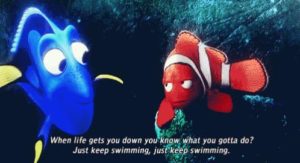Our Blogs
Learning to Swim

Think back to when you were six years old and learning to swim. If you had practised every single day, had access to professional coaches, and adopted a single-minded focus, could you have reached a Michael Phelps level of success in the pool? Looking back on it now, would you wave your magic wand and rewrite your story to make that happen?

I, for one, would not. I love swimming, and I even participated in competitions a few times as a kid, but at 5-feet nothing, I’m not sure any amount of effort would give me the skills of a man with a wingspan of over 6 feet. And I’m okay with it because I’m not passionate about swimming and I am certainly not dedicated enough to take it to an Olympic level of skill.
This brings me to my investment strategy. As with swimming, the right combination of factors could result in extraordinary success, but it is also likely that no amount of effort would make me the South Indian Warren Buffet. And just like with swimming, I’m fine with that. For a long time, I avoided the whole idea of investing because it seemed too complicated. Frequent stories of people who lost their money in the stock market or in real estate made me afraid to fail. I was happier knowing that my money was safe in the bank, rather than taking a risk in an area I knew so little about. During this pandemic, however, my approach changed. As I read more and more, I realised my biggest mistake was the DNA (do nothing approach). Keeping money in my bank account for a long period actually means that I’ve been losing money over time. My savings are meant to work for me, not sit idle for years or depreciate.
It has taken me a while to get to a point where I want a say in my finances. In fact, it was only a few years ago that I got my bank account’s contact information changed to my father’s phone number and email to my own. But even now, my father gets notified every time I swipe my card. It sounds so silly to not have complete control over my own accounts, and yet for years I let it slide because who wants to mess with the status quo (or do extra paperwork)?
To finally get started and stop doing nothing, I focused on finding an investment strategy that didn’t require me to turn into a financial wizard. The first thing I looked at was the market index, a key metric that is widely tracked. A market index comprises a number of companies that best represent a given sector. For example, a sustainability index will only include companies with a commitment to sustainable business practices. There are also overall market indices—Sensex and Nifty in India—which give an indication of how the market as a whole is doing.
I can invest in individual companies, which would mean having a good understanding of their financials and knowing what to look for — hard pass. I can also consider mutual funds, where fund managers invest in a variety of companies using their expertise — sounds like a much better option. However, except for a few Warren Buffett types, few fund managers consistently beat the market due to its inherent unpredictability.
Clearly, Index funds seemed like the best option for me. An index fund simply mimics the index itself and therefore does no better or worse than the market. Instead of trying (and failing) to beat the market, I can choose to just follow it. John Bogle, who invented index funds in 1975, posited that the lower cost of index funds would result in higher returns, ultimately outperforming actively managed funds with higher costs. I will detail the other benefits of index funds in my next blog, but the key benefit of this approach is its low-cost and low-maintenance nature. Over time, this method of investing requires insignificant amounts of my time and energy.
Like any investment strategy (including DNA), there are risks. For example, during a global recession, my investment earnings would drop dramatically, but this would be true for many other types of investment as well. The way I see it, DNA would erode my earnings because of inflation anyway. Even with the risks, investing in index funds is better than doing nothing at all. As Warren Buffet once said, ‘By periodically investing in an index fund, the know-nothing investor can actually outperform most investment professionals.’
My strategy isn’t going to work for everyone. But it meets my low-effort and low-cost criteria, while also consistently growing my money. I will never be the Phelps of investing with this approach, but with this Buffet-approved strategy, I don’t even need to try.

And when I start to worry about if I’m doing the right thing, I look to Dory from Finding Nemo…

3 comments on “Learning to Swim”
Comments are closed.
Suggested Blogs
Get in touch with us
Be the first to hear about our upcoming programs












This was a wonderful and informative piece. Well done. Hope to see more
Wow! That’s truly commendable . Nayanthara you are so so smart and challenging too. You are blessed with all the qualities needed for success especially the ability to take.up risks. God bless you .abundantly and may achieve more and more as you move on in life. Wishing you the very best
A big high 5 to the parents for allowing her to follow her passion and raising such a resourceful and intelligent child
Good advice Nayantara!!! I think many of us suffer from the DNA factor!